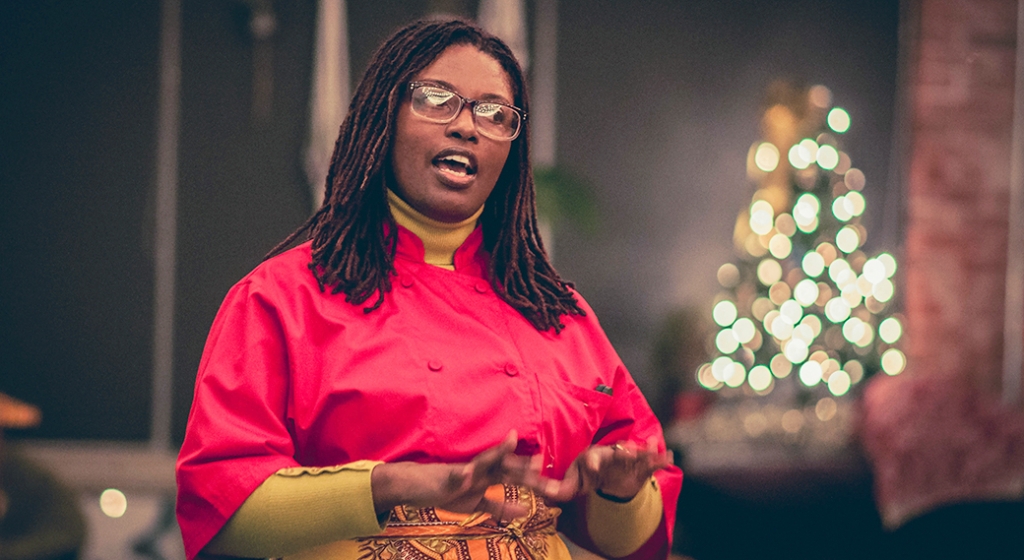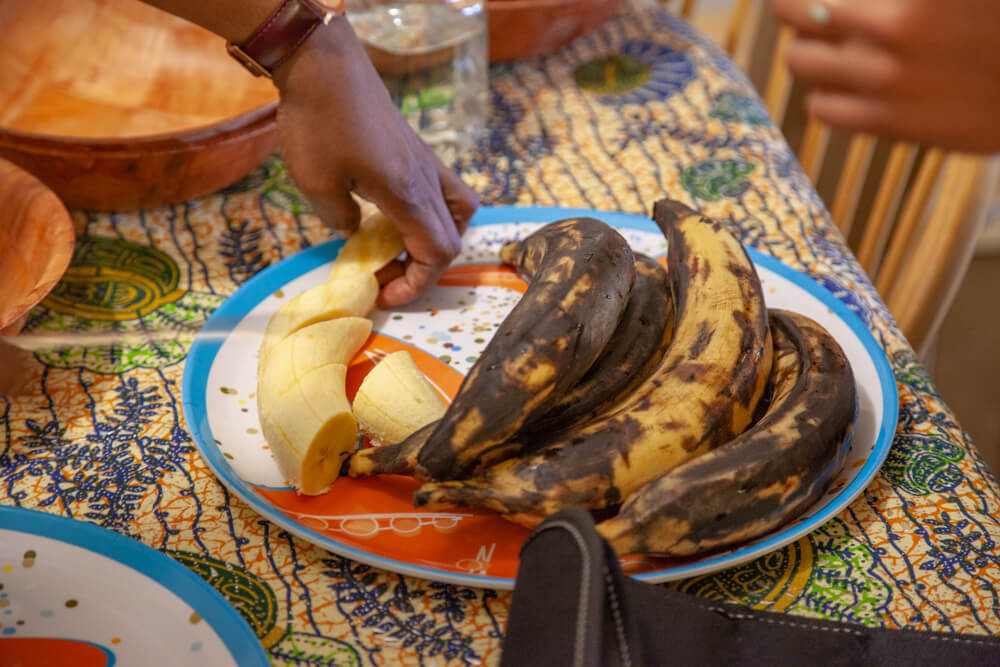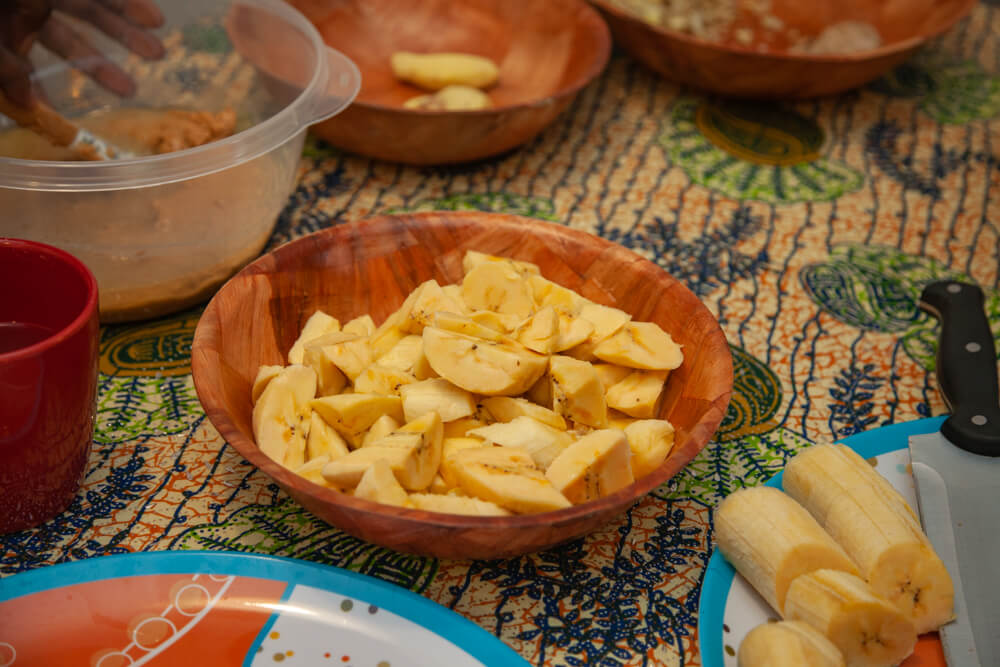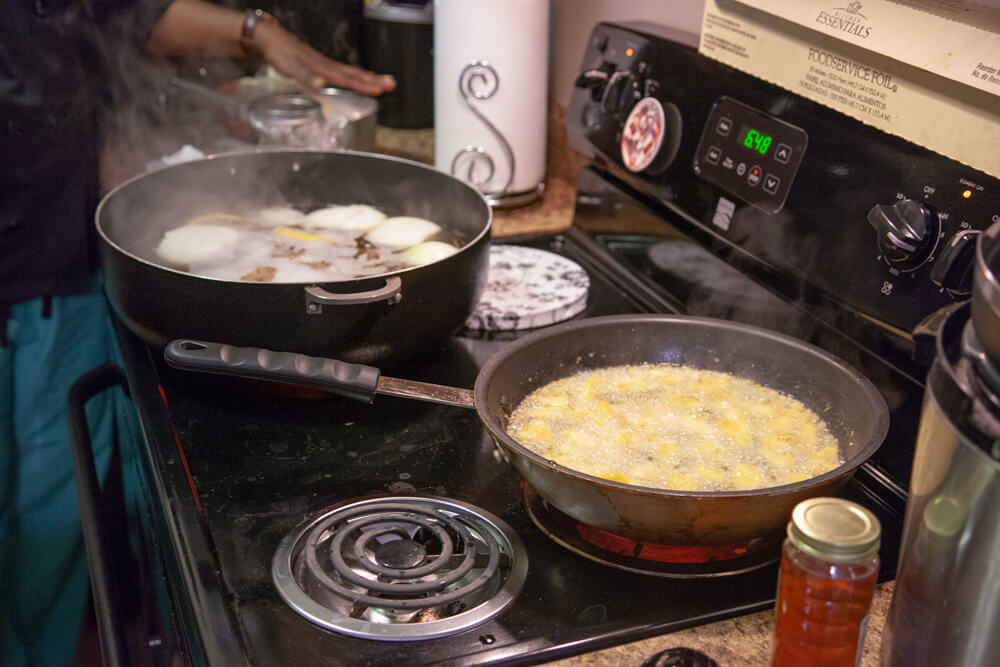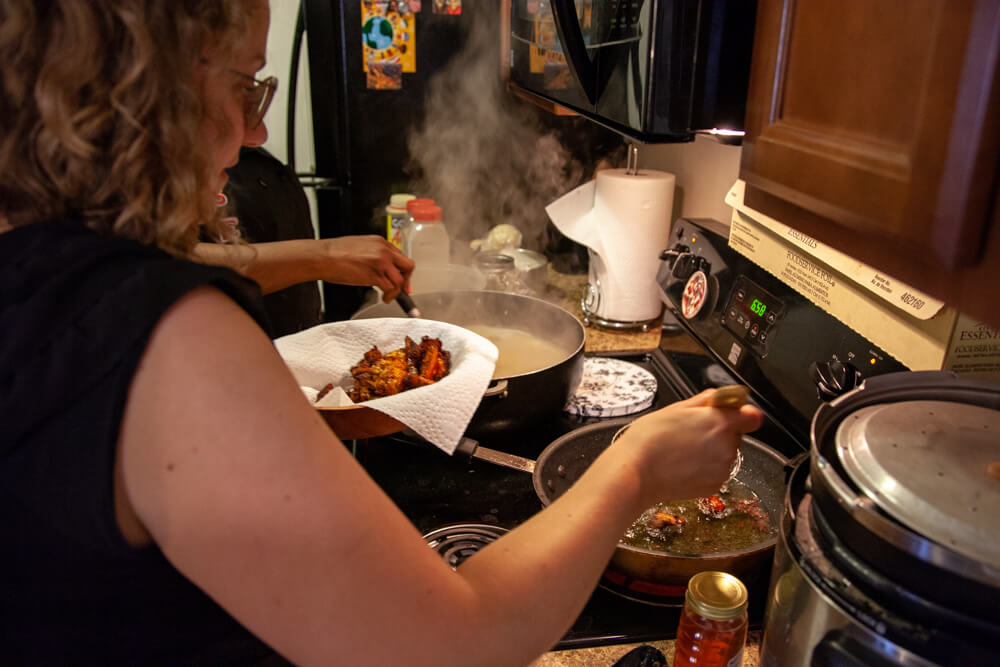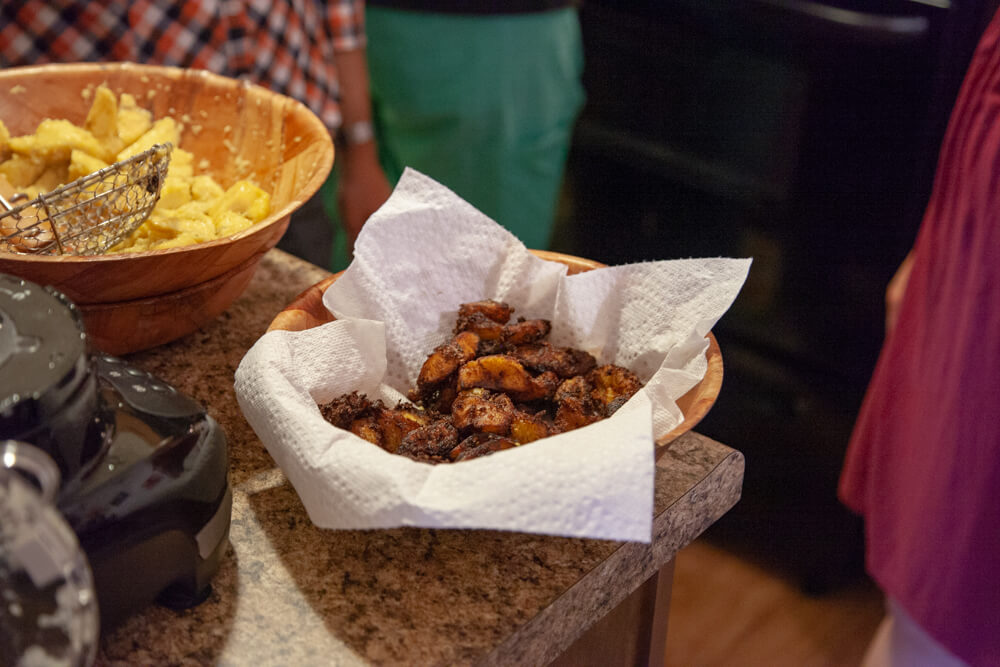Running a foodservice business never goes as planned.
Kuukua Yomekpe is a caterer and chef who recently decided to close up shop in Columbus, Ohio and pursue a full time career back in academia – with a plan to rebrand and run Asempe Kitchen on the side.
We met with Kuukua during her final Asempe Kitchen pop-up at The Hills Market Downtown. We immediately noticed that she knew nearly every other customer by name. During her nearly two years at this location, her goal was to teach Columbus everything she knows about Ghanaian food and culture.
How did Asempe Kitchen start?
I was living in Berkeley, California when I started cooking for people. I was doing it a lot and not making much money, so someone suggested that I start an actual business. I took a women’s business class for six weeks, created my business plan, and opened Asempe in the Kitchen.
I briefly put the business on hold for a two-year stay in Ghana. I bounced around for 3 years upon returning to the U.S. I ended up in Columbus, Ohio since much of my family immigrated here. I knew the landscape of Columbus, so it was easier to get on my feet and I had my mom, who is an excellent chef in her own right, helping me out.
What kind of food were you cooking?
We started out as Ghanaian and Ethiopian. My mom is a daughter of a diplomat and was raised in Ethiopia, so she speaks the language and cooks Ethiopian while I cook Ghanaian food. We weren’t doing a fusion – it’s just two types of authentic food served together as options.

So your mom was doing the Ethiopian cooking and you specialized in Ghanaian. What are some of the staples of Ghanaian cuisine?
We have a lot of starches. Cassava (yucca) is huge. Plantains are essential. We use a lot of meat like goat and beef. We use a lot of leaves of plants. So, the leaf of the cassava plant as well as the root. The leaf of eggplant. It depends on which part of Ghana you’re from and which of these is more your staple. Where I grew up we were eating eggplant, okra, and taro leaves.
You ran the Asempe Kitchen “pop-up” for almost two years at The Hills market in Columbus, OH. Define what a pop-up is.
I’d say pop-ups are a more recent thing here in Columbus but were already big in Berkeley in 2012 when I first opened Asempe. You basically show up at an established location – like a market place or food hall – and serve a cuisine that’s not being served there. You could start a pop-up in an empty garage but it’s typically a place with an existing customer base and then you introduce them to something different.
For me, I started out as more of a supper club, then I was doing underground dinner parties where people didn’t know the other people that were going, back in California, that is. In Ohio, it was catering until we did a tasting for Hills Market upon recommendation by a former colleague. Our Pop-up was born!

What’s the appeal of a pop-up for a chef and as a hungry customer?
There’s less overhead. We did some marketing at The Hills Market but were able to create a following based on Hills’ own traffic. By attracting them to our counter, people learned about us and then they followed us and soon went to other events we had. A hungry customer gets to have one more option for lunch.
Was your goal to have your pop-up open every day?
I would have loved to be open every day but just never found a location for it. Location and timing is important. I would have taken on two other places but it was hard because I wasn’t making enough to actually pay someone – I was always working alone or with my mom, who was overburdened sometimes. It’s hard serving food, running the cash register, greeting customers, getting emails – so I would end up paying someone and not really taking any money home at the end of the day.
The Asempe Kitchen pop-up at The Hills really has been a labor of love. We came because we loved the people there. The staff is wonderful. And the customers are great. But it never really made much money. Most of the time we were just operating at a loss but the joy was worth it and Kevin Palone (General manager at The Hills Market Downtown) and Amanda Anderson (the wine and cheese director at The Hills Market Downtown) were supportive and flexible.
But we continued because we love the people and the people love the food. I figured eventually we’d expand to a new location and open on more days to hopefully have a chance of making more money. But that didn’t happen.
If you were to have done anything differently while running your pop-up, what would you have done?
I think that I would have taken out a loan and gotten an actual space that was all our own. But I waited too long to the point where I was exhausted and didn’t have additional help. I was stuck not wanting to take a loan because I didn’t have enough of a customer base to make payments on the loan and I didn’t want to be stuck. Catch 22, I think?
If I had gone and applied for a loan with my business plan, then I probably would have gone down a different path. But I was just running around looking for pop-up spaces – and every single time they fell through.
Most of the time we were just operating at a loss. But we continued because we love the people and the people love our food.
I feel like we have something unique and we probably would have done well but it’s hard to move forward by myself.
On the whole between prepping and cooking at a rented commercial kitchen, paying for the pop-up space, buying ingredients, and paying someone to run the cash register – there wasn’t much money to take home. The overhead is low compared to running my own space but with your own space you can be open more days and more consistently. It’s hard to do numbers on one pop-up location once a week and know how much to cook each week.
It was like trial-and-error the whole time.
And you’re also running all the operations by yourself, right?
That’s right – I didn’t have a business partner. Not having a business partner really hindered me. No one to discuss ideas with. My mom just enjoyed the cooking part. When I thought of something, I did it, and when it didn’t work, and I’d come home and say “that didn’t work, now what?”

Do you have any advice for someone who’s looking to start a pop-up?
If you really are interested in starting a food business – start with a pop-up. It’s the best way to test the market, make sure people like the food, and make sure you’re actually a good cook. And then find someone somewhere that’ll let you pop-up there one time so you can try it out and share your culture and food.
It’s just like going to work. I started at 7am and ended at 4pm. And that’s without doing dishes. By the time we get to doing dishes, it’s 8pm. It’s not as glamorous as it looks from the outside. You have to work hard to get a good product out there.
It’s not as glamorous as it looks from the outside. You have to work hard to get a good product out there.
I had to rent a kitchen by the hour because you can’t serve food for money in Columbus without cooking out of a commercial kitchen. I think most home cooks don’t know that. They think they can do the pop-up cooking from home.
There’s also people skills. Most home cooks aren’t ready for the amount of exposure you’ll have to deal with. It’s hard to do if you’re an introvert. My mom and I are people persons. We’re on the go, we’re meeting people, we’re talking to them. People are in your face all the time and you just gotta keep moving.
I was thinking about the saying “the customer is always right” – and it’s true – they’re paying you to give them an experience, so you have to deliver.

Asempe Kitchen wasn’t just a pop-up. You were also running supper clubs, cooking classes, and private chef work. Tell us about one of your supper clubs.
For supper clubs, I’m bringing people together over food that I cook and we eat together with your friends or your family. I give lessons on the cooking and the cuisines. It’s in between a personal chef and a full-on cooking class. This is what I’ve cooked for you, this is where it’s from, this is what goes in it, this is the vegan option, this is the meat option. We’ve really worked hard to provide vegan options, which is not as commonplace in West African cuisine. Especially Ghanaian – we eat a lot of meat.
We held a Christmas supper club last year for all of our pop-up customers. Most of these people usually only came through for lunch, pick up, and go. I had never actually sat down and talked to most of them. At the pop-up I’m usually serving but for the supper club it’s family style, so I just put stuff on the table so they can serve themselves and we talk about the cuisine and culture.
Supper clubs is what I envision doing more of in the future. That’s where my energy comes from. Sitting down and talking to people. And I think as I started to think of shutting down Asempe Kitchen, I realized – I probably wouldn’t have been happy serving food every single day. Just cooking and serving and people just picking up. Because my real gift is in meeting people and teaching people how to cook and talking about the food and the culture and giving a face to that immigrant story.

So at heart you’re front-of-the-house chef, not a back-of-the-house chef.
Yes, and it’s hard to do both – cooking and talking to people. Especially when you’re working alone.
We had pitched the Asempe Kitchen pop-up at a local food hall and weren’t accepted. It was really a downer for me until I realized – I would basically just be serving food at a food hall. People coming through and me just handing out food. And that’s not why I started cooking! I started cooking to meet people and build community and use food as a vehicle to bridge differences.
The rejection was honestly a blessing in disguise. I would have had to raise money, build out the space in the kitchen, hire people – and in the end not be doing exactly what I wanted to be doing.
As for your cooking classes – what did you want people to take away from them? I assume it’s not just a recipe.
I think when people first encounter the word “African food” or “Ghanaian food,” they have their own vision of it. I want to hopefully change this vision. Mainly that it’s an approachable culture. It’s more like a showcase. A show and tell. We’re approachable and the food is approachable. Seeing all of the ingredients that go into it and how it’s cooked.
I spend the time talking about my experience growing up, where I grew up, how I grew up – and so I make the culture, that immigrant face welcoming and accessible. Now they can say, “Oh yeah, I know what egusi is!” It’s great.
Someone asked me why I spoke English so well. She probably just didn’t know that Ghana was a British colony and we all speak English now. I don’t have an accent because I’ve been in the States for over 20 years now. But the moment I get on a plane back to Ghana, I can put it back on – it’s a code switch.
So are the classes your preferred vocation?
I prefer cooking classes to Personal Chef gigs because the cooking classes because I get to talk to people, spend time with them, it’s about 2-3 hours of their time. They listen and I can hear from them too. The personal chef is not the same, it’s more of a job.
What are you plans when you move out to New York? Are we going to see Asempe Kitchen New York?
Yes! I’m going to be the Assistant Director for a career and academic center for a small college in the Ithaca area. Once I get settled, my goal is to start out with the supper clubs, cooking classes and probably revive Feast on Words. This was an event I borrowed from San Francisco where there was reading, prompt writing and food. I’ve already connected with a commercial kitchen at Cornell. I think I’ll join the farmers markets next summers and get the word out.

